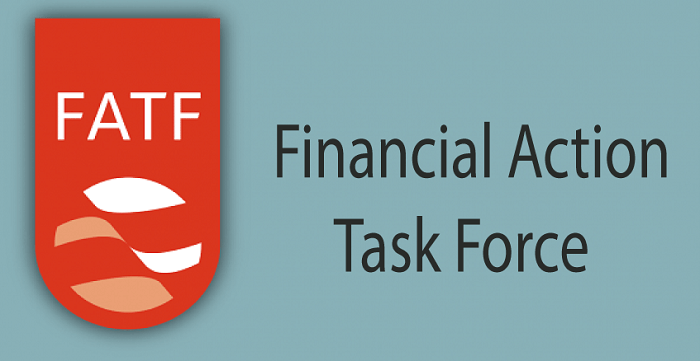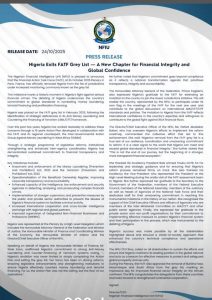On the 24th of October 2025, the Nigerian Financial Intelligence Unit (NFIU) announced in an official statement from Paris that the Financial Action Task Force (FATF) had removed Nigeria from its Grey List. The FATF, which sets global standards for preventing money laundering and terrorism financing, confirmed that Nigeria had successfully implemented all nineteen action points after nearly two years of coordinated reform.
The decision restores confidence in Nigeria’s financial system and signals that the country has met global expectations for transparency and regulatory discipline.
Nigerian founders have consistently demonstrated resoluteness, inventiveness, and unrelenting drive in their pursuit of progress. Yet with every new wave of global compliance reform, the rules of engagement in digital finance continue to shift. The world is demanding deeper transparency, stronger governance, and verifiable integrity, and Nigeria is now stepping into that conversation with renewed credibility.
The FATF announcement also confirmed that South Africa, Mozambique, and Burkina Faso were removed from the Grey List alongside Nigeria, marking a rare moment of collective progress for African economies, strengthening their defenses against illicit financial flows.
Some of the positive effects will be felt immediately in the technology and finance sectors, including easier access to venture capital, improved international transactions, and increased trust from foreign partners. Other benefits will emerge over the coming months, as Nigerian regulators, fintechs, and investors adapt to this stronger climate of credibility and compliance.
1. Renewed Global Confidence in Nigerian Finance
Nigeria’s removal from the FATF Grey List sends a clear message to the world. It shows that the country’s financial and regulatory systems are now strong enough to prevent illicit flows and monitor high-risk transactions effectively.
For Nigerian fintechs and digital platforms, this new status will reduce the burden of suspicion that previously surrounded international partnerships. During the grey-listing period, several global payment processors, banks, and investors treated Nigerian operations as high-risk, which led to delayed payments and more complicated compliance reviews.
Now, those barriers are being lifted. Startups can onboard global partners faster, open international accounts with fewer restrictions, and attract investors who had paused operations pending Nigeria’s delisting.
In short, trust has returned, and it will directly improve the ease of doing business for the country’s fast-growing tech sector.
2. Faster Venture Funding and Cross-Border Payments
One of the most immediate impacts will be on capital flow. When Nigeria was grey-listed, many venture capital firms faced extended timelines in wiring funds to Nigerian startups due to enhanced due diligence requirements.
The removal simplifies that process. Startups can now expect:
- Quicker investment settlements from foreign venture capital firms
- Reduced compliance friction when using payment platforms such as Stripe, Wise, or Payoneer
- Improved banking relationships for local fintechs and neobanks
- Greater liquidity for cross-border transactions and digital trade
This change will also benefit Nigerian founders seeking funding from development finance institutions or accelerators abroad. It signals to investors that Nigeria is once again a secure, regulated environment for high-growth technology ventures.
3. Expansion of Compliance and Regulatory Technology
Nigeria’s delisting was achieved through significant digital reform. The country passed the Money Laundering (Prevention and Prohibition) Act, created a Beneficial Ownership Register, and improved inter-agency coordination through the NFIU.
These developments have sparked demand for technology that supports monitoring, verification, and reporting. For Nigerian entrepreneurs, this opens a new frontier in RegTech and compliance-driven innovation.
Startups can now build solutions for:
- Automated KYC and AML verification
- Blockchain-based audit and reporting tools
- Data-sharing platforms for banks and regulators
- Compliance-as-a-service for SMEs and digital lenders
Regulatory technology is emerging as one of Nigeria’s most investable subsectors. Compliance has evolved from an obligation into an opportunity for growth.
4. Stronger Partnerships and Global Collaboration
Nigeria’s exit from the Grey List will encourage renewed partnerships with global fintechs, neobanks, and digital payment networks.
International companies that had slowed expansion into Nigeria can now proceed with confidence.
Payment firms such as Visa, Mastercard, and SWIFT can enhance integration with local fintechs
Global accelerators and venture funds can re-enter Nigeria’s market with clearer risk assessments
International remittance operators and lending platforms can expand services without fear of compliance sanctions
This new environment gives Nigerian fintechs the ability to scale products and export financial technology across Africa and beyond. The delisting will also make it easier for Nigerian companies to raise international bonds or equity through global exchanges.
5. Growth for Crypto and Blockchain Startups
For Nigeria’s blockchain and cryptocurrency community, this moment is transformative.
During the grey-listing period, several global exchanges and custodians restricted activity with Nigerian banks and wallets, citing AML and CFT concerns. Now, those restrictions are being reconsidered.
Crypto startups, stablecoin providers, and Web3 innovators can once again access banking relationships, compliance certifications, and payment integrations that were previously unavailable.
This will likely trigger growth in:
- Crypto-to-fiat gateways
- Stablecoin remittance platforms
- Digital identity and verification systems
Nigeria’s fintech ecosystem already leads Africa in blockchain adoption. The country’s upgraded compliance standing will now allow those innovations to attract institutional partners and global recognition.
6. Strengthened Policy Environment for Nigerian Founders
The reforms that led to Nigeria’s removal from the Grey List provide an important model for the country’s startup community.
They demonstrate that growth and compliance can exist together. Nigerian founders should apply similar discipline within their organizations. That means:
- Keeping ownership structures transparent
- Embedding governance and reporting tools in their products
- Using technology to monitor risk and prevent abuse
- Promoting responsible innovation that aligns with regulatory priorities
Startups that integrate these values early will stand out to both investors and regulators. Trust and accountability will be as critical to future success as innovation itself.
7. A New Chapter for Nigeria’s Digital Economy
Nigeria’s removal from the FATF Grey List has restored confidence in the country’s ability to build and sustain credible systems. The benefits will start to appear quickly in investment flows and partnerships, while deeper structural advantages will emerge over the next year.
The fintech sector will gain access to new markets, investors will find fewer compliance obstacles, and regulators will have stronger tools for oversight.
For Nigeria’s technology community, this is a defining opportunity to build global-standard companies in an environment of renewed credibility. The spotlight is now firmly on Nigerian innovation, and the world is watching.

















